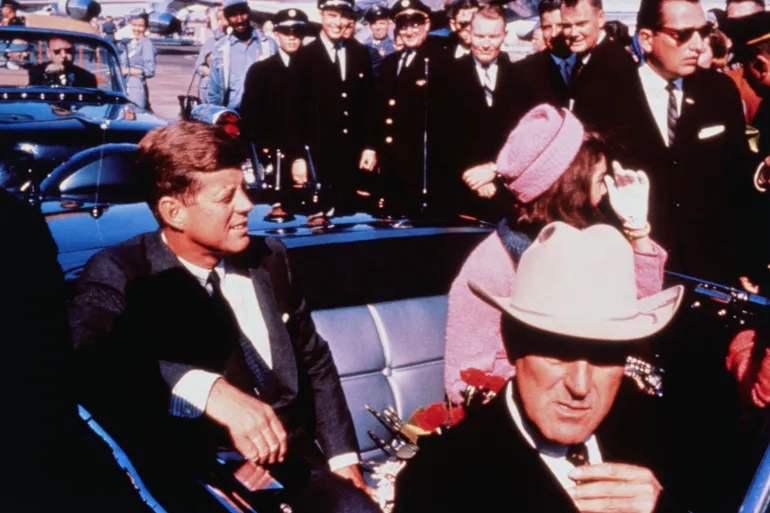For decades, the assassination of President John F. Kennedy has been shrouded in secrecy, speculation, and conflicting narratives. While the official story points to Lee Harvey Oswald acting alone, newly released government files reveal a much more complex web of intelligence operations, covert agendas, and financial powerhouses operating behind the scenes.
With the recent declassification of 80,000 documents, the picture becomes clearer—and far more disturbing. The names that appear in these files are not random: The CIA, the Rothschild family, and covert operations like Operation Mongoose all played significant roles in shaping the geopolitical landscape of the time. And now, decades later, their influence remains just as powerful.
CIA The Puppet Masters of Global Affairs
The Central Intelligence Agency (CIA) has long been suspected of involvement in Kennedy’s assassination. The newly released files confirm that Oswald was under CIA surveillance long before the assassination. In fact, declassified records show that Oswald had meetings with Soviet and Cuban intelligence agents in Mexico City—conversations that the CIA monitored but never publicly disclosed at the time.
Even more damning are the revelations that the CIA had direct knowledge of assassination plots within the U.S. government, and in many cases, actively orchestrated such operations overseas. One of the most significant programs at the time was Operation Mongoose, a series of covert actions designed to destabilize and overthrow Fidel Castro’s Cuban government.
Why does this matter? Because newly released documents suggest that Kennedy was actively working to dismantle the CIA’s unchecked power, particularly after its failures during the Bay of Pigs invasion. His intent to pull back from Vietnam and break up the CIA’s operations put him in direct opposition to the agency’s leadership—and history shows what happens to those who challenge the intelligence community.
The Rothschild Connection: Control Beyond Government
The Rothschild family, one of the most powerful financial dynasties in history, also finds itself indirectly linked to this labyrinth of control. While their name does not appear in the assassination documents themselves, their influence over global banking and intelligence operations at the time is undeniable.
Consider this: Kennedy signed Executive Order 11110, which aimed to strip the Federal Reserve—heavily influenced by Rothschild-controlled banking interests—of its monopoly on U.S. currency. This move would have drastically reduced the power of private banking elites over American economic policy.
Less than six months later, Kennedy was dead. His successor, Lyndon B. Johnson, immediately reversed Kennedy’s policies, ensuring that control over American currency remained in the hands of private financial institutions.
The question is: Was Kennedy’s assassination simply about politics—or was it also about financial control at the highest levels?
Operation Mongoose The Blueprint for Covert Regime Change
Before there was "regime change" in the Middle East, there was Operation Mongoose.
Launched under the Kennedy administration, Operation Mongoose was the CIA’s top-secret initiative to remove Fidel Castro from power in Cuba. While Kennedy initially supported it, he later became increasingly wary of the CIA’s extreme tactics, which included false flag attacks, psychological warfare, and assassination plots.
Declassified documents now confirm that elements within Operation Mongoose went rogue, operating outside of Kennedy’s direct oversight. This raises an unsettling possibility:
If factions within the CIA were willing to assassinate foreign leaders without Kennedy’s approval—why would they hesitate to turn against him when he became a threat to their agenda?
The Bigger Picture A Coup in Broad Daylight
The new JFK files don’t just point to a single gunman in Dealey Plaza—they expose a deeply entrenched system of intelligence manipulation, financial control, and covert warfare.
- The CIA had motives to remove Kennedy, as he threatened their unchecked power.
- The Rothschild-controlled banking system stood to lose if Kennedy successfully weakened the Federal Reserve.
- Operation Mongoose and intelligence black ops show a pattern of secret assassinations and regime changes—a blueprint that continues to this day.
For decades, those who questioned the official narrative were labeled "conspiracy theorists". Yet, with every document release, the so-called theories become undeniable truths.
So now the question isn’t whether Kennedy was assassinated as part of a larger conspiracy—it’s who else has been eliminated for challenging the same system? And how much control do these forces still hold today?
Stay tuned for a deeper analysis!

